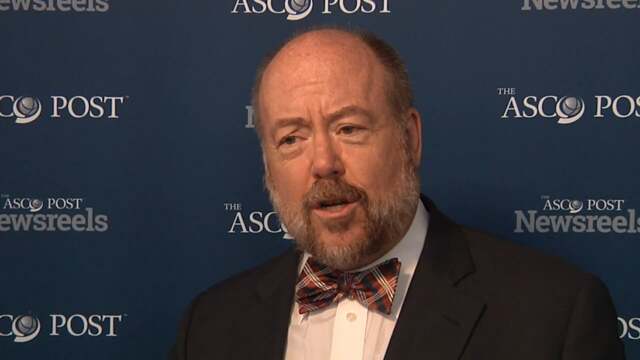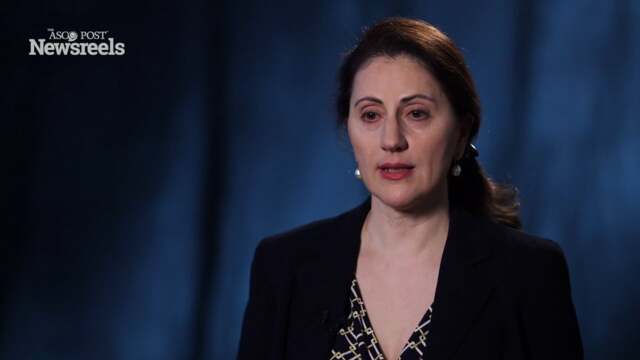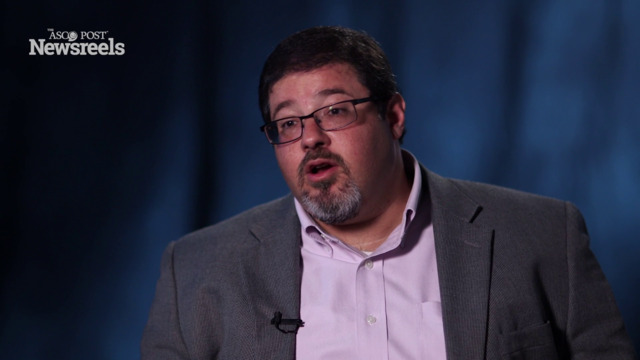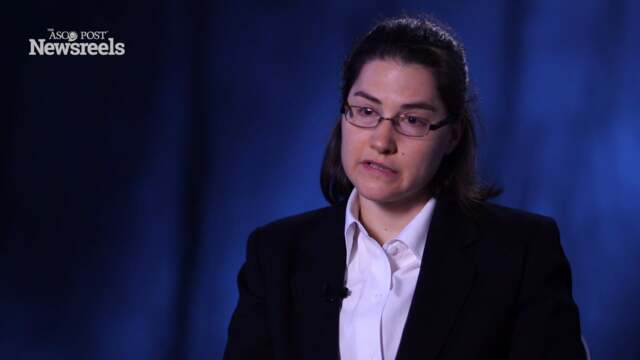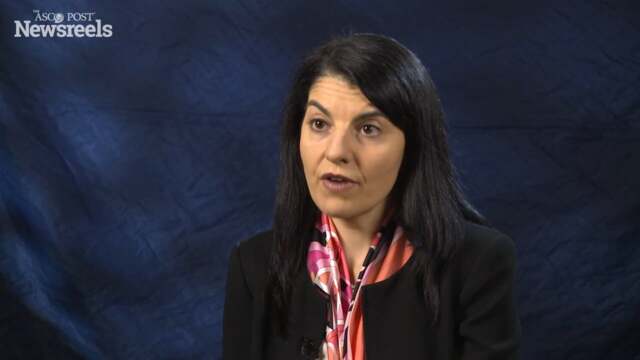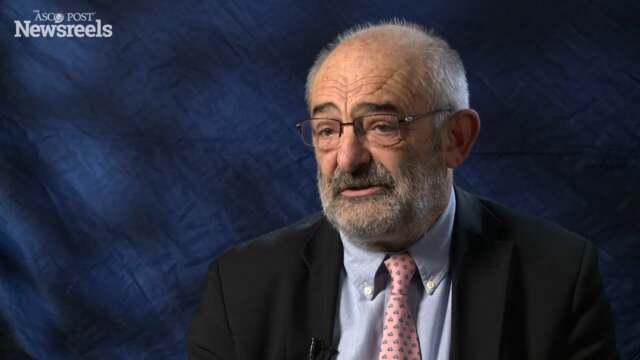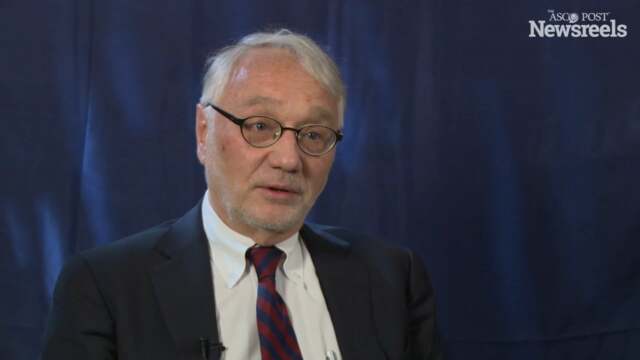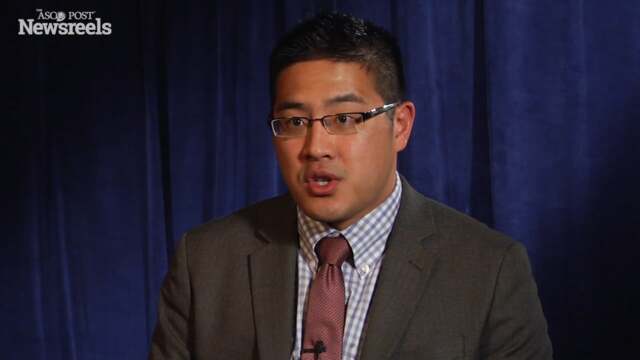Leora Horn, MD, MSc, on Targeted and Emerging Therapies for Metastatic NSCLC
Leora Horn, MD, MSc, of the Vanderbilt-Ingram Cancer Center, discusses the range of treatment options for people with lung cancer, including third generation inhibitors, and the key clinical trials studying alternatives for patients with acquired resistance.
Gregory A. Otterson, MD, on Adjuvant Therapy and Immunotherapy for Lung Cancer
Gregory A. Otterson, MD, of The Ohio State University Comprehensive Cancer Center and the James Cancer Hospital and Solove Research Institute, discusses the evolution of lung cancer treatment from adjuvant chemotherapy to immunotherapy and the clinical trials underway.
David E. Gerber, MD, and James L. Mulshine, MD, on Bringing Genomic Discovery and Targeted Therapies to Early-Stage Lung Cancer
James L. Mulshine, MD, of Rush University Medical Center, and David E. Gerber, MD, of The University of Texas Southwestern Medical Center, discuss the ALCHEMIST trial, an NCI initiative to address the role of molecular testing and targeted therapies for earlier-stage lung disease (Abstract TPS7583).
Carolyn Jean Presley, MD, and James L. Mulshine, MD, on New Lung Cancer CT Screening Guidelines and Treatment Burden
James L. Mulshine, MD, of Rush University Medical Center, and Carolyn Jean Presley, MD, of Yale Cancer Center/Yale School of Medicine, discuss the burden on patients and the Medicare system as new lung cancer CT guidelines are put into effect and treatment of early-stage NSCLC increases (Abstract 7533).
Areej El-Jawahri, MD, and Eric Roeland, MD, FAAHPM, on Quality of Life and Satisfaction With Care
Eric Roeland, MD, FAAHPM, of the University of California, San Diego Moores Cancer Center, and Areej El-Jawahri, MD, of Massachusetts General Hospital, discuss two important studies on early palliative care and the use of anamorelin in advanced NSCLC with cachexia.
Charles F. von Gunten, MD, PhD, Discusses Anamorelin and Olanzapine for Palliative Care
Charles F. von Gunten, MD, PhD, of OhioHealth Kobacker House discusses the ROMANA 1 and 2 trials on cachexia in NSCLC and a study on olanzapine vs fosaprepitant for the prevention of nausea and vomiting (Abstracts 9500 and 9502).
Luis G. Paz-Ares, MD, PhD, Summarizes Results of the CheckMate 057 Trial on Nonsquamous Cell NSCLC
Luis G. Paz-Ares, MD, PhD, of the Hospital Universitario Doce De Octubre, discusses the superior overall survival in patients taking nivolumab vs docetaxel in advanced nonsquamous NSCLC (Abstract LBA109).
Ramaswamy Govindan, MD: Roundup of Lung Cancer Findings
Ramaswamy Govindan, MD, of Washington University, summarizes three important papers: ROVA-T in relapsed and refractory small cell lung cancer, genomic characterization of large-cell neuroendocrine tumors, and the ECOG study on bevacizumab following chemotherapy for resected non–small cell lung cancer.
Guneet Walia, PhD, on Central Issues in Lung Cancer Care
Guneet Walia, PhD, of the Lung Cancer Foundation, summarizes some key presentations: bridging the quality chasm, patients’ attitudes and physicians’ perceptions on maintenance therapy, and patient advocacy.
Jennifer King, PhD: Scientific Perspectives From the Lung Cancer Alliance
Jennifer King, PhD, of the Lung Cancer Alliance, gives her perspective on major themes of this year’s meeting: the stigma of lung cancer, the changing face of who is affected, early detection, and advances in immunotherapy.
Everett E. Vokes, MD, on Controversies in Stage IIIA Disease
Everett E. Vokes, MD, of the University of Chicago, summarizes expert views on treating stage IIIA disease: decision-making in selecting patients for surgery; multiple-modality choices; and using induction chemotherapy (Abstract ED10).
Naiyer A. Rizvi, MD, on Immune Checkpoint Inhibitors
Naiyer A. Rizvi, MD, of Columbia University, offers an update on immune checkpoint inhibitors in non–small cell lung cancer: what’s new and what’s next.
Nagashree Seetharamu, MD, on Anti-Glycan Antibody Profiling in De Novo Stage IV Non Small Cell Lung Cancer
Nagashree Seetharamu, MD, of the North Shore LIJ Health System, discusses serum AGA-signatures that may provide a minimally invasive test for early detection of lung cancer risk (Abstract P3.04-085).
William D. Travis, MD, on Pathology and Genetics of Lung Tumors: 2015 WHO Classification
William D. Travis, MD, of Memorial Sloan Kettering Cancer Center, gives an update on the WHO classification, which is crucial for optimal personalized treatment of lung cancer patients (Abstract PLEN02.01).
Fred R. Hirsch, MD, PhD, and Paul A. Bunn, Jr., MD, on the Highlights of the World Conference on Lung Cancer
Fred R. Hirsch, MD, PhD, of the University of Colorado Health Science Center, and Paul A. Bunn, Jr, MD, of the University of Colorado Cancer Center, give their views on the goals and important presentations of the 2015 World Conference on Lung Cancer.
Karen Kelly, MD, on PD-1 Axis Inhibition and the Treatment of Advanced Disease
Karen Kelly, MD, of the University of California, Davis, summarizes three important papers on NSCLC: expression as a predictive biomarker; pembrolizumab, immune-mediated adverse events, and corticosteroid use; and an evaluation of disease-related symptoms in patients treated with nivolumab or docetaxel (Abstracts ORAL 31.01, 31.02, and 31.03).
Philip Bonomi, MD, on SBRT and Surgery for Localized Disease
Philip Bonomi, MD, of Rush Medical College, summarizes a debate on two important issues: choosing between surgery and stereotactic body radiation therapy (SBRT) in operable NSCLC, and whether or not to use SBRT for nonbiopsied lung nodules (Abstract PC 01).
Philip Bonomi, MD, on Results of the Romana 1 and Romana 2 Trials
Philip Bonomi, MD, of Rush Medical College, summarizes the findings on anamorelin and its use in advanced NSCLC for improvement in anorexia/cachexia symptoms (Abstracts ORAL 29.01, ORAL 29.02).
Ugo Pastorino, MD, on Reducing Lung Cancer Mortality
Ugo Pastorino, MD, of the Istituto Nazionale dei Tumori Foundation, discusses his study, which showed that stopping smoking before or during low-dose computed tomography screening reduced overall mortality by more than 25%, a benefit that is three- to fivefold greater than this type of screening (Abstract PLEN04.07).
Pasi A. Jänne, MD, PhD, on Integration of Next Generation Data Into the Clinic
Pasi A. Jänne, MD, PhD, of Dana-Farber Cancer Institute, summarizes a workshop he conducted on the state of the art in next-generation sequencing of lung cancer (Abstract WS 01.07).
James R. Jett, MD, on Screening With Early CDT and CT
James R. Jett, MD, of National Jewish Health, discusses his study of the early CDT-Lung biomarker. His hypothesis: When used in combination with low-dose CT in screening of a high-risk population, this biomarker would increase the detection of early-stage lung cancer (Abstract MINI 12.11).
Vassiliki Papadimitrakopoulou, MD, on The Lung MAP Clinical Trial
Vassiliki Papadimitrakopoulou, MD, of MD Anderson Cancer Center, discusses the ways in which patients, investigators, and pharmaceutical companies are working together to accelerate research and access to care (Abstract MTE 02.01).
James L. Mulshine, MD, on Lung Cancer Screening in the United States: Can It Happen?
James L. Mulshine, MD, of Rush University Medical Center, discusses the profound challenges of implementing national CT screening to ensure delivery of high-quality, best-practice early lung cancer detection in the target population of tobacco-exposed individuals (Abstract MS 15.01).
Christine D. Berg, MD, on Screening for Lung Cancer in Those at High Risk
Christine D. Berg, MD, of Johns Hopkins Medicine, discusses how increased insurance coverage should dramatically increase lung cancer screening. If done correctly—which will be a challenge—screening will help improve the prognosis of patients with lung cancer (Abstract PLEN 01.01).
Alice T. Shaw, MD, PhD, on ALK, Crizotinib, and Alectinib
Alice T. Shaw, MD, PhD, of Massachusetts General Hospital, summarizes efficacy and safety data from studies on crizotinib, brigatinib, and alectinib for ALK-positive non–small cell lung cancer (ORAL 33.03, 33.06, 33.07).
Heather A. Wakelee, MD, on Results of the E1505 Clinical Trial
Heather A. Wakelee, MD, of Stanford University discusses the study that explored the question of whether adding bevacizumab to adjuvant chemotherapy is beneficial in the setting of resected non–small cell lung cancer (Abstract PLEN04.03).
Tony Mok, MD, and Fred R. Hirsch, MD, PhD: Summary of the IASLC Presidential Symposium
Tony Mok, MD, of The Chinese University of Hong Kong, and Fred R. Hirsch, MD, PhD, of University of Colorado Health Science Center discuss the highlights of the featured plenary session, which included the conference’s top four abstracts (Abstract PLEN04).
Roy S. Herbst, MD, PhD, on Results From SWOG S0819
Roy S. Herbst, MD, PhD, of the Smilow Cancer Hospital at Yale Cancer Center, discusses his findings of a phase III study comparing carboplatin/paclitaxel or carboplatin/paclitaxel/bevacizumab with or without concurrent cetuximab in advanced non–small cell lung cancer (Abstract PLEN04.01).
Silvia Novello, MD, PhD: Lung Cancer Is a Women's Disease Too
Silvia Novello, MD, PhD, of the University of Turin, discusses a much-neglected aspect of lung cancer: It is not just the province of men; women are affected in great numbers as well.
Barbara J. Gitlitz, MD: Genomics of Young Lung Cancer Study
Barbara J. Gitlitz, MD, of USC/Norris Cancer Center, discusses the first prospective study on the genomic drivers and demographics of lung cancer in patients under 40 who took part in the study remotely via the Internet (Abstract ORAL22.05).
Howard Jack West, MD, on New Kinase Targets for Treating Advanced NSCLC
Howard Jack West, MD, of the Swedish Cancer Institute, summarizes three important papers: anlotinib as third-line treatment for refractory advanced non–small cell lung cancer; the EGFR exon 20 mutation as a prognostic/predictive biomarker; and EGFR exon 18 mutations as molecular predictors of sensitivity to afatinib or neratinib (Abstracts ORAL 3.01, 3.02, and 3.03).
Eric Lim, MD, on Increasing Incidence of Non-Smoking Lung Cancer
Eric Lim, MD, of the Royal Brompton and Harefield NHS Trust, discusses his findings on the nonspecific symptoms of never-smokers, which suggests that imaging could play a more important role in diagnosing these patients at an earlier stage.
Lorraine Cheryl Pelosof, MD, PhD, on Never-Smokers in NSCLC
Lorraine Cheryl Pelosof, MD, PhD, of UT Southwestern Medical Center, discusses her study findings, which demonstrate an increasing proportion of never-smokers among patients with non–small cell lung cancer (Abstract ORAL 22.01).
M. Catherine Pietanza, MD, on A Promising New Agent for SCLC
M. Catherine Pietanza, MD, of Memorial Sloan Kettering Cancer Center, discusses rovalpituzumab tesirine, a promising DLL3-targeted antibody drug conjugate, the first precision treatment for small cell lung cancer (Abstract 7LBA).
Benjamin Besse, MD, PhD, and Tony Mok, MD, on Results of the BIRCH Clinical Trial
Benjamin Besse, MD, PhD, of the Institut Gustave Roussy, and Tony Mok, MD, of The Chinese University of Hong Kong, discuss this phase II trial of atezolizumab as first-line or subsequent therapy for locally advanced or metastatic PD-L1–selected NSCLC (Abstract 17LBA).
Jean-Yves Douillard, MD, PhD, on New Perspectives in Small Cell Lung Cancer
Jean-Yves Douillard, MD, PhD, of Centre R Gauducheau, reviews new clinical trials and data on systemic and radiation treatment of small cell lung cancer.
Tony Mok, MD, and Alice Shaw, MD, PhD: Expert Perspectives on ALK Inhibition and Brigatinib
Tony Mok, MD, of The Chinese University of Hong Kong, and Alice Shaw, MD, PhD, of Massachusetts General Hospital, discuss the current status and future outlook of ALK inhibition, and an assessment of brigatinib CNS activity in patients with ALK-positive non-small cell lung cancer and intracranial metastases (Abstract 3061).
Jean-Charles Soria, MD, PhD, on Results of the KEYNOTE 001 Clinical Trial
Jean-Charles Soria, MD, PhD, of Gustave Roussy, summarizes an important study: the efficacy and safety of pembrolizumab in previously treated non-small cell lung cancer (Abstract LBA33).
Jean-Charles Soria, MD, PhD, on Results of the Lux Lung 8 Clinical Trial
Jean-Charles Soria, MD, PhD, of Gustave Roussy, summarizes an important study: afatinib vs erlotinib in squamous cell carcinoma of the lung.
Rolf A. Stahel, MD, on Results From the BELIEF Trial
Rolf A. Stahel, MD, of University Hospital, Zurich, discusses this phase II trial of erlotinib and bevacizumab in patients with advanced, EGFR-mutated non-small cell lung cancer without T790M mutation. The study was sponsored by The Spanish Lung Cancer Group and the European Thoracic Oncology Platform (Abstract 3BA).
Amelie Harle, MD, on Aprepitant for Cough in Lung Cancer
Amelie Harle, MD, of the Christie NHS Foundation Trust, discusses a clinical trial––the first of its kind—designed to assess the efficacy of an antitussive in patients with lung cancer (Abstract 2).
Stephen G. Chun, MD, on NSCLC: Results From NRG Oncology/RTOG 0617
Stephen G. Chun, MD, of MD Anderson Cancer Center, discusses the comparison of 3D conformal and IMRT outcomes for locally advanced non-small cell lung cancer (Abstract 2).
Brian D. Kavanagh, MD, on Improving Value and Elevating the Patient Care Experience
Brian D. Kavanagh, MD, of the University of Colorado School of Medicine, summarizes three papers: outcomes for locally advanced non–small cell lung cancer, 3D CRT vs image-guided intensity-modulated radiotherapy for reducing bowel toxicity, and dexamethasone for controlling pain flares in patients with bone metastases (Abstracts 2, 8, LBA6663).
Roy Decker, MD, PhD, on Chemoradiation in Elderly Patients With Limited-Stage SCLC
Roy Decker, MD, PhD, of Yale University School of Medicine, discusses a National Cancer Database analysis that showed elderly patients with limited-stage small cell lung cancer can benefit from adding concurrent radiation to chemotherapy (Abstract 1010).
Stage Increase in Lung Cancer More Frequent After Open vs Closed Thoracic Surgery
An increase in the stage of non–small cell lung cancer (NSCLC) due to cancer-positive lymph node discovery was more common following open chest surgery for lung lobe removal of early-stage lung cancer compared to the closed-chest procedure known as video-assisted thoracic surgery (VATS). The...
The Evolving Treatment Landscape of ALK-Positive NSCLC
Since the initial discovery of ALK rearrangement in non–small cell lung cancer (NSCLC) in 2007,1 small molecule tyrosine kinase inhibitors of ALK have transformed the course of disease for those patients with ALK-rearranged (ie, ALK-positive) NSCLC. Crizotinib (Xalkori), a multitargeted tyrosine...
Global and North American Phase II Studies Show Alectinib Is Highly Active in Crizotinib-Resistant/Refractory ALK-Rearranged NSCLC
In two phase II trials, reported in the Journal of Clinical Oncology and The Lancet Oncology, the ALK inhibitor alectinib (Alecensa), which is active against acquired crizotinib resistance mutations and exhibits high central nervous system (CNS) penetration, was associated with considerable...
ALK Rearrangements Common in Young Patients With Lung Cancer
Two investigative groups have reported interesting observations about genomic alterations in the tumors of young patients with lung cancer. Notably, ALK rearrangement was the most common driver mutation found, in studies reported at the 16th World Conference on Lung Cancer.1,2 “To our knowledge,...
Bevacizumab Plus Chemotherapy Fails to Prolong Survival in Early-Stage Lung Cancer
Overall survival in patients with surgically resected early-stage non–small cell lung cancer (NSCLC) did not improve with the addition of bevacizumab (Avastin) to chemotherapy, according to the findings of a study researchers have called a “top abstract” from the 16th World Conference on Lung...
Study Finds Alectinib Highly Active in ALK-Positive, Crizotinib-Resistant NSCLC
In a North American phase II trial reported in The Lancet Oncology, Shaw et al found that alectinib (Alecensa), which is active against acquired crizotinib (Xalkori) resistance mutations and exhibits high central nervous system (CNS) penetration, was associated with considerable activity in...





